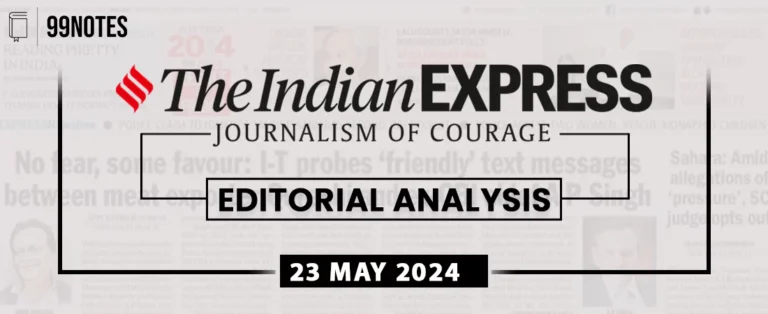6 March 2024 : Indian Express Editorial Analysis
Indian Express Editorial Analysis
6-March-2024
1. For the Gaya Lals of today
| Topic: GS2 – Polity – Indian Constitution – Amendments This topic is relevant for both Prelims and Mains in the context of knowing facts about constitutional provisions related to defection. |
| Context: |
|
Defection Dynamics and Legal Lacunae:
- The landscape of Indian politics is rife with examples of defections, showcasing the wide gap between rhetoric and action in upholding constitutional integrity.
- From the antics of politicians like Gaya Lal, who switched parties in a single day, to the sophisticated maneuvers employed today, the essence of the anti-defection law is routinely circumvented.
- Despite amendments and judicial pronouncements, the prevalence of defections underscores the limitations of constitutional law in curbing opportunistic political behavior.
The ill-Repute of the 10th Schedule:
- The reputation of the 10th Schedule, far from being tarnished by a lack of legal clarity, stems from its ineffectiveness in deterring defections.
- Recent judicial pronouncements, such as the Manipur judgment, have attempted to set guidelines for timely adjudication of disqualification petitions.
- However, the practical application of these directives often falls short, allowing ample room for manipulation and delay.
- Despite legal provisions aimed at curbing defections, the prevalence of political jugglery persists, rendering the anti-defection law largely toothless in practice.
Challenges in Enforcement and Adjudication:
- The role of the Speaker, entrusted with adjudicating complaints of disqualification, presents inherent challenges due to partisan affiliations.
- Despite being the sole authorized entity for such adjudication, the Speaker’s alignment with a particular political party often compromises impartiality.
- This partisan bias manifests in prolonged delays in addressing complaints from opposition parties, while prompt action is taken against defectors aligned with the ruling party.
- Furthermore, innovative tactics, such as preemptive defection applications and engineered resignations, exploit loopholes in the legal framework, further undermining its efficacy.
Proposed Solutions and the Role of the Speaker:
- In light of the pervasive shortcomings of the current system, calls for the abolition of the 10th Schedule and its replacement with a simplified mandate gain traction.
- Advocates propose stringent measures, including mandatory resignations and prohibitions on holding ministerial positions without re-election upon party defection.
- Additionally, suggestions to reform the role of the Speaker, by eliminating partisan affiliations and ensuring a non-partisan selection process, aim to restore credibility to the adjudicatory process.
- However, the feasibility and implementation of such reforms remain subjects of debate within the Indian political landscape.
Conclusion:
- The discrepancy between legal frameworks and their practical application in addressing defections highlights deep-seated challenges within the Indian political system.
- While legal provisions exist to uphold constitutional integrity, the pervasiveness of opportunistic political behaviour necessitates comprehensive reforms.
- Addressing the inherent biases in the adjudicatory process and strengthening mechanisms to deter defections are essential steps towards restoring public trust and integrity in Indian democracy.
- Only through concerted efforts towards reform can the law cease to be derided as an “ass” and fulfill its intended purpose of upholding democratic principles.
| What is the Anti-Defection Law? |
What are some of the judicial observations regarding defection in India?
|
| PYQ: Which one of the following Schedules of the Constitution of India contains provisions regarding anti-defection? (2014) (a) Second Schedule (b) Fifth Schedule (c) Eighth Schedule (d) Tenth Schedule Ans: (d) |
| Practice Question: Discuss the challenges faced in enforcing the anti-defection law in India. Analyze the gap between constitutional principles and their practical application in curbing political defections. (250 words/15 m) |
2. PROTECTING DEBATE
| Topic: GS2 – Polity – Parliament – Functioning This topic is relevant for both Prelims and Mains in the context of knowing facts about constitutional principles, parliamentary privileges, and the functioning of democratic institutions. |
| Context: |
|
Erosion of Democratic Foundations: Chief Justice’s Assertion:
- Chief Justice DY Chandrachud, leading a seven-judge bench, underscored the detrimental impact of corruption and bribery on Indian parliamentary democracy.
- He emphasized that such practices undermine the foundational principles of the Constitution, eroding the aspirational and deliberative ideals essential for a responsible, responsive, and representative democracy.
- This assertion highlights the broader ramifications of bribery in the functioning of democratic institutions.
Case Background and Constitutional Interpretation:
- The case originated in 1993 when JMM leader Shibu Soren and other party members were accused of accepting bribes related to a no-confidence motion against the PV Narasimha Rao government.
- The earlier interpretation of parliamentary privileges, based on Article 105(2), emphasized lawmakers’ freedom of speech and voting.
- However, the recent verdict emphasizes that bribery compromises the free will and conscience essential for lawmakers to discharge their duties effectively.
- The ruling stresses the need to interpret privileges in alignment with the larger ideals of the Constitution, rather than as absolute rights disconnected from democratic principles.
Addressing Quid Pro Quo and Affirming Equality:
- The Supreme Court’s ruling also tackles the issue of quid pro quo associated with bribery, asserting that the mere acceptance or seeking of undue advantage with the intent to act in a certain way is sufficient to constitute the offense.
- Additionally, the court affirms the principle of equality, stating that creating a class of public servants afforded extraordinary protection would violate Article 14 of the Constitution.
- This reaffirmation underscores the importance of upholding constitutional principles in adjudicating matters related to parliamentary privileges.
Cautionary Note and Future Implications:
- While the ruling signifies a crucial step towards maintaining democratic integrity, caution is warranted to ensure that it does not leave opposition legislators vulnerable to undue targeting.
- In an environment where debate and disagreement in legislative bodies are increasingly challenged, both the executive and judiciary face the imperative of fostering a fearless atmosphere conducive to robust discussions and exchange of ideas.
- Upholding the court’s directive to create such an environment will be pivotal in safeguarding democratic norms and principles in the years ahead.
Conclusion:
- The Supreme Court’s ruling not only rectifies previous interpretations of parliamentary privilege but also underscores the imperative of upholding democratic values and equality under the law.
- It sets a precedent for future cases while emphasizing the pivotal role of democratic institutions in preserving the integrity of India’s parliamentary democracy.
| Privileges and Immunities to the MPs and MLAs |
Meaning:
Constitutional provisions:
Privileges mentioned in the Constitution:
Purpose:
Difference between Article 19 and Article 105:
|
| PYQ: The ‘Powers, Privileges and Immunities of Parliament and its Members’ as envisaged in Article 105 of the Constitution leave room for a large number of un-codified and un-enumerated privileges to continue. Assess the reasons for the absence of legal codification of the ‘parliamentary privileges’. How can this problem be addressed? (200 words/12.5m) (UPSC CSE (M) GS-2 2014) |
| Practice Question: Discuss the recent Supreme Court ruling overturning its previous judgment on parliamentary privilege, emphasizing the non-protected status of bribery in legislative proceedings. Analyze the implications of this ruling on democratic principles and institutional integrity in India. (250 words/15 m) |
For Enquiry

6 March 2024 : Indian Express Editorial Analysis

5 Mar 2024 : Daily Current Affairs Quiz

4 Mar 2024 : Daily Current Affairs Quiz

5 Mar 2024 : Daily Answer Writing

5 March 2024 : Daily Current Affairs

5 March 2024 : Indian Express Editorial Analysis

5 March 2024 : PIB Summary for UPSC

5 March 2024 : The Hindu Editorial Notes PDF

Civil Disobedience Movement: Cause, Limitations, And Impact

Yojana Summary: January 2024 – Ease Of Doing Business
Indian Express 6 March 2024 : Indian Express Editorial Analysis Indian Express Editorial Analysis
5-March-2024
1. Let Pakistan be
Topic: GS2 – International Relations…
Daily Quiz 5 Mar 2024 : Daily Current Affairs Quiz 5 Mar 2024 : Daily Quiz…
Daily Quiz 4 Mar 2024 : Daily Current Affairs Quiz 4 Mar 2024 : Daily Quiz…
mains answer writing 5 Mar 2024 : Daily Answer Writing Mains Answer Writing
5-March-2024
Q1) Examine the mandate and powers of the National Commission for…
Daily Current Affairs 5 March 2024 : Daily Current Affairs Daily Current Affairs
5-March -2024- Top News of the Day
1. Supreme Court Challenges Parliamentary Privilege:…
Indian Express 5 March 2024 : Indian Express Editorial Analysis Indian Express Editorial Analysis
5-March-2024
1. Let Pakistan be
Topic: GS2 – International Relations…
March 2024 PIB 5 March 2024 : PIB Summary for UPSC PIB Summary for UPSC
5-March -2024
1. DefConnect 2024: Raksha Mantri launches ADITI scheme to promote…
March – The Hindu Editorial 5 March 2024 : The Hindu Editorial Notes PDF The Hindu Editorial
5-March-2024
1. World Trade Organization continues to struggle to foster free and…
general studies 1 Civil Disobedience Movement: Cause, Limitations, And Impact Civil Disobedience Movements:
Civil Disobedience Movement, one of the most pivotal episodes in India’s…
Yojana Summary Yojana Summary: January 2024 – Ease Of Doing Business Yojana Magazine Summary January 2024
Yojana magazine is monthly magazine published by government of India’s…



